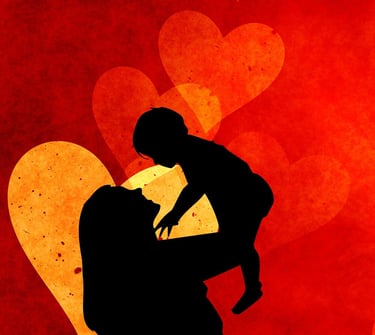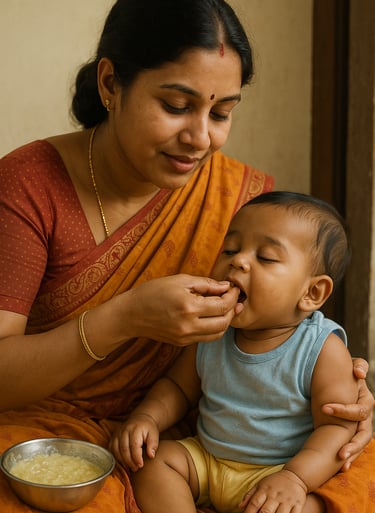A Mother Between Two Worlds: The Story of a Family Lost in Translation
A tender journey through love, language, and longing — witness how one mother's silence speaks across cultures, generations, and the spaces between home and heart.
MINDMUSE


In the serene landscape of Norway, where the northern lights ripple across the winter sky and the silence speaks the language of a well-ordered society, a quiet storm of grief and misunderstanding was gathering. Sagarika Bhattacharya, a mother from India, had always believed that the love she poured into her children, through every shared meal, every lullaby, every moment spent in the embrace of family, was universal. Yet, in a land far from home, this love would be seen through a lens that misunderstood its very essence.
The year was 2011. Sagarika and her husband, Anurup Bhattacharya, both of Indian origin, had moved to Norway seeking work and a new life. But their world collapsed when Barnevernet, the Norwegian Child Welfare Services, intervened and placed their three-year-old son and one-year-old daughter into foster care. The reasons left many in India shocked and bewildered. The couple’s choice to sleep beside their children, hand-feed them warm meals, and keep them close in a world far from home was seen by authorities not as nurturing but as hindering independence. Allegations surfaced: the children were too dependent, lacking developmental autonomy. Yet what most deeply wounded Sagarika was the label of being ‘mentally unfit.’
This judgment stemmed from observations by caseworkers who mistook Sagarika’s anxiety, perhaps born from isolation and cultural displacement, as emotional instability. Her expressive gestures, her distress in the face of their intervention, and her unfamiliarity with Norwegian norms of child-rearing were interpreted through a psychiatric lens, contrasting sharply with her identity as a devoted mother. Anurup, too, was cited for being emotionally distant and uninvolved in caregiving, even though such roles often shift across cultures.
The Norwegian child protection system, underpinned by principles of early intervention and preventive care, is designed to protect children from potential harm. Reports of neglect or emotional abuse, sometimes arising from teachers, daycare workers, or neighbours, prompt investigations. Caseworkers assess home environments and interactions, measured against Scandinavian norms that emphasize individual autonomy from a very young age. Barnevernet, though well-intentioned in its safeguarding of children’s rights, has often faced criticism for its lack of sensitivity to cultural differences.
The Bhattacharya family’s world was in turmoil. Their children were placed into foster care, and the process of legal battles, language barriers, and the weight of foreign bureaucracy made their fight feel insurmountable. During this silent agony, the Indian consulate in Oslo was alerted to the situation, possibly through community reports or an official appeal from the family. The Indian authorities, moved by the emotional gravity of the case and aware of its diplomatic ramifications, intervened.
News of the case soon reached India, triggering a wave of public outrage. Sushma Swaraj, then Leader of the Opposition, strongly condemned the actions of Barnevernet. Brinda Karat, a senior leader of the CPIM, also spoke out passionately in support of the Bhattacharyas. The Indian Ministry of External Affairs quickly took diplomatic steps, pressing Norway on the matter and facilitating communication between the family and authorities. The Indian embassy in Oslo offered consular support, ensuring that Sagarika and Anurup were not left to fight alone.
Months of tense negotiations followed. While Norway stood firm in its legal position, reluctant to return the children directly to the parents, a compromise was reached: the children would be sent to India under the custody of their paternal uncle. Though a bittersweet outcome, this decision at least brought the children closer to their cultural roots. However, Sagarika was not content with just distance. She later took legal action in India and, through a lengthy process, was granted full custody, finally reuniting with her children in both spirit and presence.
Their story didn’t just fade away—it found its way into the mainstream. In 2023, the Hindi film Mrs. Chatterjee vs. Norway, inspired by Sagarika’s memoir The Journey of a Mother, brought their struggle back into public consciousness. Though dramatized, the film gave voice to a mother’s anguish, shining a light on the silent battles waged in the courts of foreign lands and the hearts of parents.
But the Bhattacharya case was not an isolated one. Families from across the globe—Polish, Russian, Tamil, Filipino—have faced similar clashes with Barnevernet. Critics argue that while Norway’s system is rooted in child protection, its application often lacks the warmth of cultural understanding. Support services like parenting classes or psychological counselling are available, but can be difficult for immigrants to access due to language barriers, unfamiliarity with the system, and fear of systemic bias.
The case raises a crucial question: how do we protect children in a world where parenting is shaped not just by rules, but by histories, climates, languages, and shared moments over a mother’s hand-made meal?
To Barnevernet, autonomy and psychological detachment from parents are seen as signs of healthy development. In Indian homes, love is inseparable from closeness, from the physical presence of parents in a child’s early years. Neither approach is inherently wrong, yet when one standard is imposed upon the other, misunderstandings and wounds inevitably emerge.
The Bhattacharyas’ journey serves as a poignant reminder that parenting cannot be reduced to universal templates. It must be approached with empathy, not through rigid institutional frameworks. In the quiet corners of their Oslo apartment, what Sagarika and Anurup offered was not neglect, but a love that transcended borders—a love that sought only to nurture their children in the language of their hearts.
Subhalakshmi Buragohain


Love served warm, from a mother’s hand — the Indian way.
